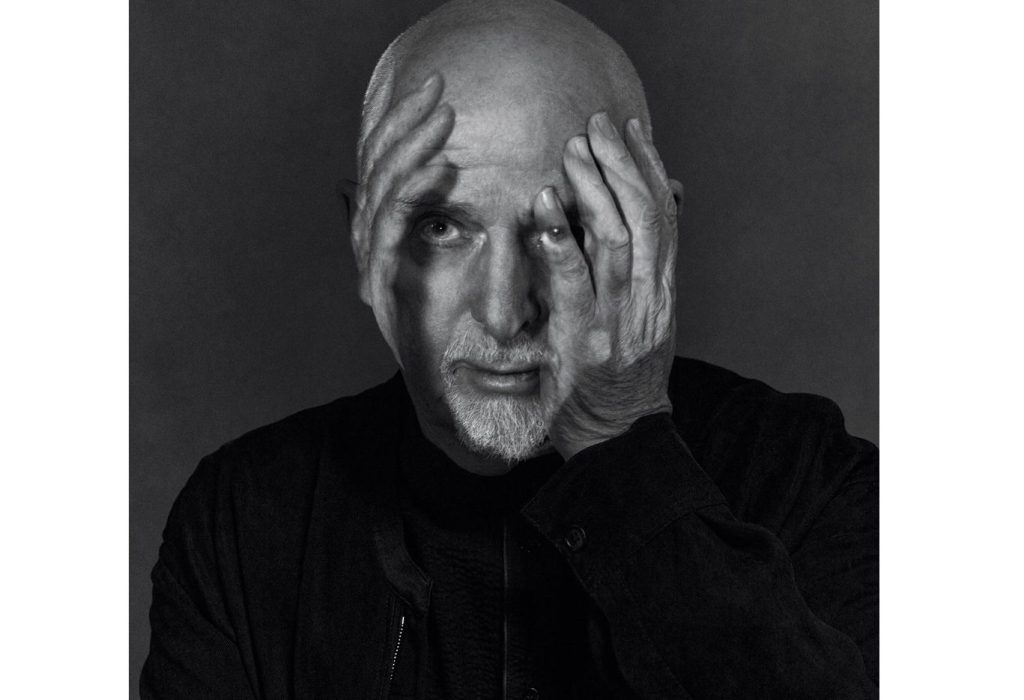Peter Gabriel is terribly fond of a Big Idea. With Genesis he would sing in character as a lawnmower, a fox and as “Slipperman.” His final work with the band, in 1974, was The Lamb Lies Down on Broadway, a double album driven by what we might kindly describe as a “kaleidoscopic” narrative involving a Puerto-Rican protagonist on a voyage of self-discovery in New York City.
Since going solo there has always been plenty of stuff whirling around each new Gabriel project. His Real World HQ in England’s West Country is part recording studio, part hi-tech hippie lab, encompassing conceptual technological probing, multimedia collaborations, NGOs and various foundations.
i/o is best when Gabriel leans into a natural inclination towards melancholic introspection
In not unrelated news, it has been twenty-one years since Gabriel last put out a record of original material. His first album since Up in 2002 is not short of Big Ideas. The album comes in three different mixes — “Bright-Side,” “Dark-Side” and “In-Side” — while throughout this year, a new track has been released each full moon, accompanied by pieces of specially commissioned visual art. During all this, Gabriel was busy touring Europe and the US.
;768:[300×250,336×280,320×100];0:[300×250,320×100,320×50]”]The risk, after a year of advanced foreplay, is that the arrival of the album itself will prove anticlimactic. Perhaps the best approach is simply to set aside all the slightly exhausting context. Without knowing anything of Gabriel’s methodology, is this a record you might wish to receive from Santa? There are twelve new songs here: what’s the cracker/turkey ratio?
The good news is that Gabriel has retained both the power and range of his wondrous voice and his ability to write compellingly in a manner which balances atmosphere, texture, rhythm and melody. Surprisingly, perhaps, the music doesn’t feel labored. Instead, the tortuous gestation period has had the positive impact of setting the bar high in terms of song quality.
While there’s no whiff of filler, not everything is entirely top drawer. “Road To Joy” is one of those fun but faceless funk-pop stomps that Gabriel has seemed obliged to write since the days of “Sledgehammer” and “Big Time.” The jarringly constructed “Olive Tree” is punctuated by cheesy brass parps more reminiscent of his old mucker Phil Collins and is lyrically heavy-handed. “Here in this helmet I can read other minds” isn’t an especially poetic representation of the age of virtual reality.
Elsewhere i/o contains some of Gabriel’s best music, a pulsing fusion of electronics, world music, soul, rock, R&B and orchestrated ballads. The vast cast list includes Gabriel’s core band of Tony Levin (bass), Manu Katche (drums) and David Rhodes (guitar), as well as hefty contributions from Brian Eno. “Love Can Heal” recalls the brilliant, brooding “Mercy Street” from So. “This Is Home” rolls on an easy soulful groove, which feels archetypal.
i/o stands for input/output and heralds a theme of sorts concerning universal consciousness, mutual dependency, and the search for more nourishing connections between man and machine. Gabriel imagines a utopian ideal harnessed by tech at its most enlightened. I suspect he’s not a regular user of Elon Musk’s bottom-feeding social media platform, X.
;768:[300×250,336×280,320×100];0:[300×250,320×100,320×50]”]The lyrics follow the dark/bright binary. “Four Kinds of Horses” is expertly crafted arena-shaped alienation. “Panopticom” and “The Court” are thick, heavy dystopian blues. The optimism lands less surely. “Live And Let Live” aspires to be the anthemic offspring of “Biko” and “In Your Eyes.” Name-checking William Blake, Desmond Tutu, Mandela and Martin Luther King, it features the rousing declamations of the Soweto Gospel Choir and urges agitators to “release the shackles… lay your weapons down.” The sleek pan-globalism, both musically and lyrically, feels pat for an artist as curious and complex as Gabriel.
I like i/o best when Gabriel leans into what I suspect is a natural inclination towards melancholic introspection. The creation of the album spans the artist’s shift from middle to old age. At seventy-three, there is an elegiac feel to much of the record. “And Still” — written for his late mother — is disarmingly intimate. “I place my head against your skin/ As I did as a boy,” he sings over a meandering, playfully inventive piece of very English pastoral music. The beautifully orchestrated ballad “Playing For Time” — where he sounds very like Randy Newman — blends the personal apocalypse of inevitable mortality to a looming ecological one. “So Much” mines a similar vein, as age wizens the body and obscures “the wild-eyed child within.”
I’m “just a part of everything,” Gabriel sings on the rousing title track, where he imagines his bones sinking into the roots of an old oak tree. It is in these small, personal moments, rather than via its Big Ideas, that i/o ultimately proves itself an album well worth waiting for.
This article was originally published in The Spectator’s UK magazine. Subscribe to the World edition here.






















Leave a Reply